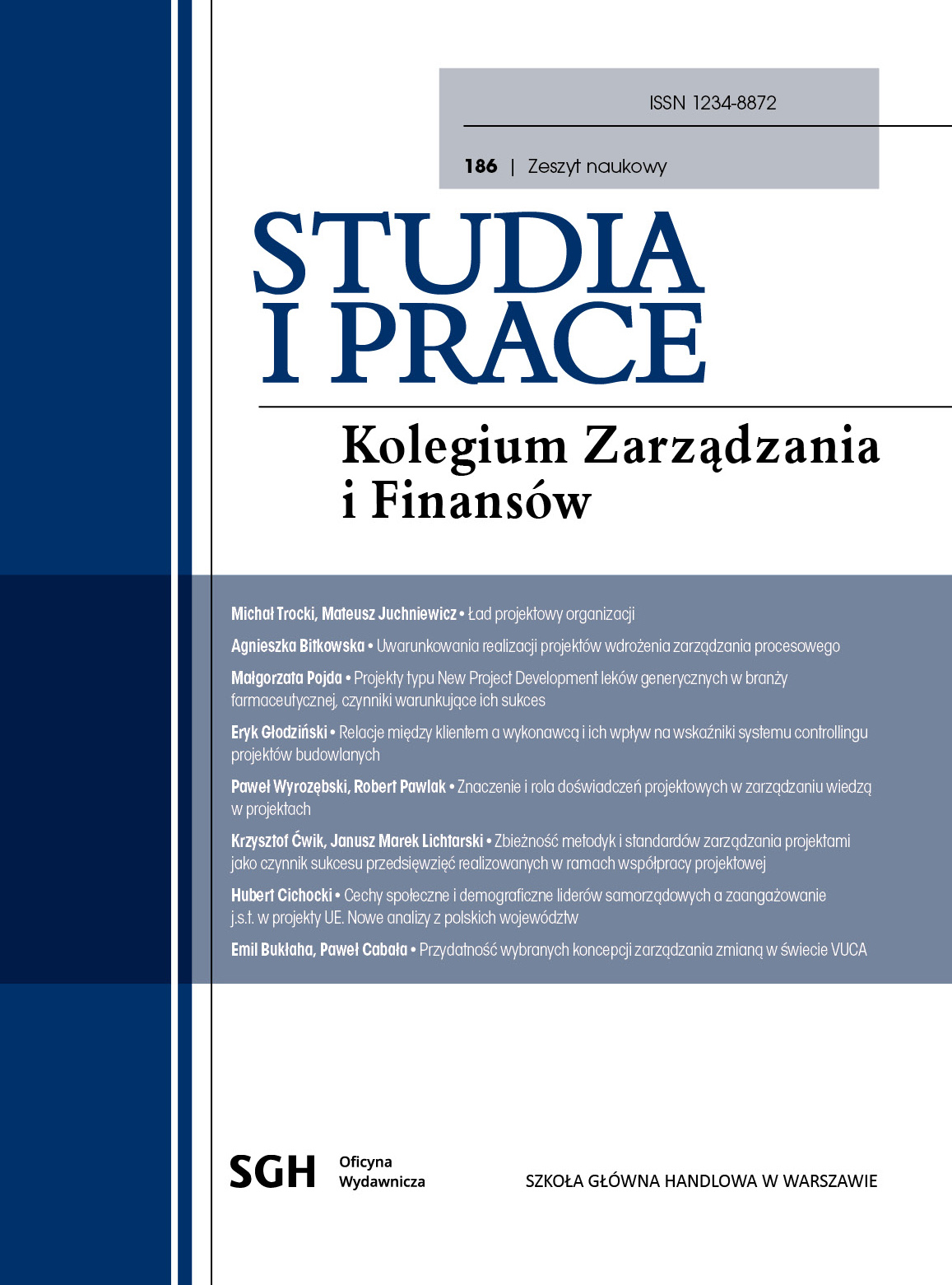Conditions for the implementation of business process management projects
DOI:
https://doi.org/10.33119/SIP.2022.186.2Keywords:
project, business process management, business process management implementationAbstract
The implementation of business process management projects in organizations is popular with many enterprises, regardless of their size or the sector in which they operate. Efficient implementation, a holistic approach in this concept focuses on the efficient functioning of processes in the context of the goals and strategic assumptions of the organization. Despite the use of many solutions and methodologies, projects are not always successful, and during their implementation there are many difficulties and limitations. Therefore, a research problem arises: What conditions of business process management projects in contemporary organizations influence their success, and what factors cause their failure? The considerations and the results of research work show the undertaken design solutions at the strategic and operational level. The key success factors are the linking of the strategic and operational levels, the involvement of human capital at all levels of the organization, and the involvement of employees as well as building an organizational culture open to changes with the support of IT tools.
Downloads
References
2. Bitkowska A. [2019], Od klasycznego do zintegrowanego zarzadzania procesowego, CH Beck, Warszawa.
3. Bitkowska A. [2021], Zarządzanie procesowe w organizacjach, Oficyna Wydawnicza Politechniki Warszawskiej, Warszawa.
4. BPM–Labors der Hochschule Koblenz, Studienbericht Metastudie, https://www.hs-koblenz.de/bpm-labor (data pobrania: 10.09.2022).
5. Brajer-Marczak R. [2021], Zaangażowanie pracowników w doskonalenie procesów biznesowych, Wydawnictwo Uniwersytetu Ekonomicznego we Wrocławiu, Wrocław.
6. Bukłaha E. [2019], Menedżerski controlling projektów, Oficyna Wydawnicza SGH, Warszawa.
7. Chountalas P. T., Lagodimos A. G. [2018], Paradigms in business process management specifications: a critical overview, „Business Process Management Journal”, vol. 25 (12), DOI:10.1108/BPMJ-01-2018–0023.
8. Cyfert S. [2006], Strategiczne doskonalenie architektury procesów w zarzadzaniu przedsiębiorstwem, Wydawnictwo Akademii Ekonomicznej w Poznaniu, Poznań.
9. Dumas M., La Rosa M., Mendling J., Reijers H. (Eds.) [2013], Fundamentals of business process management, vol. 1, Springer.
10. Dumas M., La Rosa M., Mendling J., Reijers H. A. [2018], Introduction to Business Process Management. In Fundamentals of Business Process Management, Springer Berlin Guide to the Business Process Management Common Body of Knowledge, Heidelberg, Berlin, s. 1–33.
11. El Ghalbzouri H., El Bouhdidi J. [2022], Integrating Business Intelligence with Cloud Computing: State of the Art and Fundamental Concepts, „Smart Innovation, Systems and Technologies”, vol. 237, https://doi.org/10.1007/978–981–16–3637-0_14.
12. Gudelj M., Delic M., Kuzmanovic B., Tesic Z., Tasic N. [2021], Business Process Management Model as an Approach to Process Orientation, „International Journal of Simulation Modelling”, vol. 20 (2), https://doi.org/10.2507/IJSIMM20-2–554.
13. Harmon P., Wolf C. [2020], The State of Business Process Management, https://www.bptrends.com/bptrends-surveys/ (data pobrania: 10.09.2022).
14. Jeston J., Nellis J. [2014], Business process management: practical guidelines to successful implementations, Routledge.
15. Jurczuk A. [2021], Barriers to implementation of business process governance mechanisms, „Engineering Management in Production and Services”, vol. 13 (4), s. 22–38, DOI: 10.2478/emj-2021–0029.
16. Kruk M. [2020], Procesowe zarządzanie kosztami w zakładach ubezpieczeń, Oficyna Wydawnicza Politechniki Warszawskiej, Warszawa.
17. Lyke-Ho-Gland H. [2020], Frameworks: How We Use Framework Matters, January 6, https://www.bptrends.com/frameworks-how-we-use-frameworks-matters/ (data pobrania: 10.09.2022).
18. Mendling J., Pentland B. T., Recker J. [2020], Building a Complementary Agenda for Business Process Management and Digital Innovation, „European Journal of Information Systems”, vol. 29 (3), https://doi.org/10.1080/0960085X.2020.1755207.
19. Najlepsze praktyki we wdrażaniu koncepcji BPM [2012], Carrywater Group SA – PROCESOWCY. PL, http://carrywater.com/wp-content/uploads/2012/09/raport_dobre_praktyki_BPM1.pdf (data pobrania: 20.10.2022).
20. Nosowski A. [2010], Zarządzanie procesami w instytucjach finansowych, CH Beck, Warszawa.
21. Nowosielski S. [2017], Procesy i projekty w zarzadzaniu zmianą organizacyjną, „Prace Naukowe Uniwersytetu Ekonomicznego we Wrocławiu”, nr 463.
22. Reijers H. A. [2021], Business Process Management: The Evolution of a Discipline, „Computers in Industry”, vol. 126, https://doi.org/10.1016/j.compind.2021.103404.
23. Rummler A. G., Brache A. P. [2000], Podnoszenie efektywności organizacji, PWE, Warszawa.
24. Schmiedel T., Recker J., vom Brocke J. [2020], The Relation between BPM Culture, BPM Methods, and Process Performance: Evidence from Quantitative Field Studies, „Information Management”, vol. 57 (2), https://doi.org/10.1016/j.im.2019.103175.
25. Sliż P. [2021], Organizacja procesowo-projektowa: istota, modelowanie, pomiar dojrzałości, Difin, Warszawa.
26. Stabryła A. [2022], Zarządzanie procesowe. Problemy metodologiczne, CH Beck, Warszawa.
27. Trkman P. [2010], The critical success factors of business process management, „International Journal of Information Management”, vol. 30 (2), s. 125–134.
28. Trocki M. [2016], Inteligencja procesowa, czyli inteligentne zarządzanie procesowe, „Studia i Prace Kolegium Zarządzania i Finansów SGH, Zeszyt Naukowy”, nr 149.
29. Trocki M., Juchniewicz M. [2022], Ład projektowy organizacji (project governance). Koncepcje, problemy, rozwiązania, Oficyna Wydawnicza SGH, Warszawa.
30. Ubaid A. M., Dweiri F. T. [2020], Business process management (BPM): terminologies and methodologies unified, „International Journal of System Assurance Engineering and Management”, s. 1–19.









